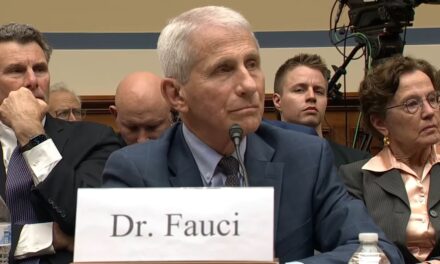We support our Publishers and Content Creators. You can view this story on their website by CLICKING HERE.
Everybody makes mistakes. By its own admission, that includes Google.
Late last week, PragerU received notice that its app was suspended and removed from Google Play, which boasts the largest app store in the world in terms of content volume. Citing its vague and subjective “hate speech” policy, Google’s decision to invoke the policy was apparently triggered by PragerU’s new documentary, “Dear Infidels: A Warning to America,” which shares stories of victims who fled violent Islamic regimes.
Within hours, Google retracted its suspension and restored access to the app. Upon further review, a spokesman told The Epoch Times the app had been suspended in error. So sorry for the inconvenience, friends.
But there’s plenty of reason to be suspicious of the tech giant’s mea culpa. Most glaringly, this isn’t the first time PragerU has been censored by Google. In fact, the tech giant’s past censorship of PragerU on YouTube sparked a federal lawsuit that, while ultimately unsuccessful, could hardly have gone unnoticed at corporate headquarters in Silicon Valley.
So it must be asked: Is Google really this hapless? And is PragerU really that unlucky?
It doesn’t take a supersleuth dreamed up by the likes of Agatha Christie or Sir Arthur Conan Doyle to solve this mystery. It’s more along the lines of “Colonel Mustard with the lead pipe in the library.”
It’s clear what happened here. Out of the more than 3 million apps available for download on Google Play, it singled out PragerU for censorship. Still available? Hitler’s Mein Kampf, coupled with abhorrent reviews praising “the man, the myth, the legend.” That PragerU is hateful and Mein Kampf is not under Google’s policies shows how easily “hate speech” policies lead to arbitrary and dangerous censorship.
Worse is the serious damage Google’s censorial policies and impulses can have on public discourse. With over $2 trillion in market capitalization, Google is the fourth-largest corporation in the world. As such, it holds far more influence over markets and individuals than most nations. Google has strayed far from its “Don’t be evil” roots and now epitomizes a significant evil in any free society — picking and choosing which opinions are acceptable in the public square.
Every instance of censorship implicates free speech and threatens the corporation’s bottom line. Because Google is a publicly traded company, shareholders — including conservatives who support PragerU — stand to lose money based on the corporation’s excursions in speech suppression. Other previously unassailable brands such as Disney, Target, and Bud Light serve as cautionary tales that in today’s cultural landscape, no company is exempt from brand-destroying accountability for getting crosswise with shareholders and customers on issues of public concern.
Google has a golden opportunity to reverse course and prevent future censorship. It could do so by following the lead of JP Morgan Chase and eliminating its highly problematic “hate speech” policy.
As our Viewpoint Diversity Score Business Index demonstrates, Corporate America is riddled with censorious policies like these. In our review of 85 major tech and financial companies, we found that 76 percent have vague or subjective terms of service, including 69 percent of scored financial institutions and 100 percent of digital service providers.
Policies like these practically guarantee censorship for Americans of every political stripe. While conservative groups like PragerU are certainly bearing the brunt of the fallout from these policies, a shift in the political winds could just as easily place those on the left in the same predicament.
It is axiomatic that an error only becomes a mistake when you refuse to correct it.
Google has admitted its error. That’s a good start. But it remains to be seen whether Google — and other companies that are gatekeepers to the digital public square — will be willing to make important changes to make sure it doesn’t happen again.

 Conservative
Conservative  Search
Search Trending
Trending Current News
Current News 





